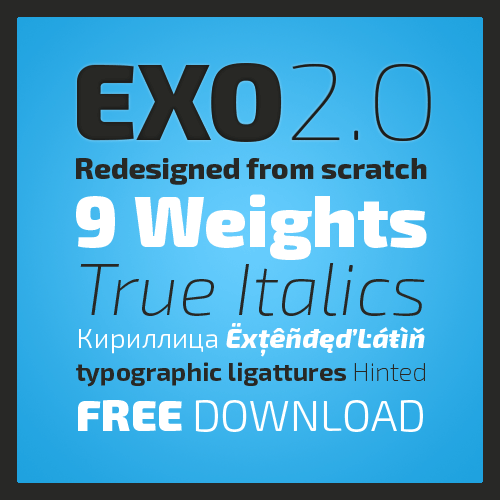Back in the days when he was a student, Portuguese graphic and type designer Natanael Gama started to play with glyphs — as a way to discover typography. Doodling around, he created Exo, a font which he released for free in a Kickstarter project. The project turned out to be quite successful. Exo became so popular that Natanael did a complete redesign.
It was two years ago. Today, Natanael is no longer a student and Exo has evolved into what we are happy to present to you today: Exo 2.0, an elegant, contemporary geometric sans serif typeface.
For Exo 2.0, every single glyph has been redesigned from scratch to achieve maximum legibility without compromising on the aesthetics.
Exo 2.0 has a more organic look and increased contrast, so it performs much better at small font sizes and on long passages of text. The fatigue of the reader is reduced by increasing the white space around the glyphs. Exo 2.0 has been released under the SIL Open Font License 1.1.
Exo 2.0 now has a bigger language coverage specially due to the integration of cyrillic characters in all the glyphs on all of the 9 weights both in upright and italic. All glyphs were hinted. Hinting adjusts the design of the glyphs to the pixel grid, creating a better flow of text specially on small font sizes.

Exo 2.0 is a very versatile font. It has 9 weights (the maximum on the web) and each with a true italic version.
Download The Freebie
- Download the font for free (.zip, 0.75 MB)
Behind The Design
Here are some insights from Natanael himself:
Along with the redesign of the glyphs, I also redesigned the space around the glyphs. Typography is designing the form as much as designing the counter form. Spacing and kerning was a problematic issue in the older Exo, but now it looks beautiful (however, don’t buy it from me, test it for yourself).This new design is very versatile and I hope to see it used in very different contexts, as the first version has been used. Exo 2.0 has a very contemporary look, so if you want your design to look fresh and stand out, I encourage you to use it.
Even though this font was primarily designed with screens in mind, I also thought about print, so don’t be admired if you see subtle ink traps and find some ligatures for you to have some fun.
Further Reading on SmashingMag:
- Benton Modern, A Case Study On Art-Directed Web Typography
- Letters Do Not Stand By Themselves
- Unicode For A Multi-Device World
- Taking A Closer Look At Arabic Calligraphy
 (ea)
(ea)








